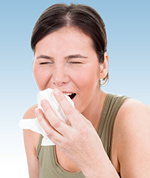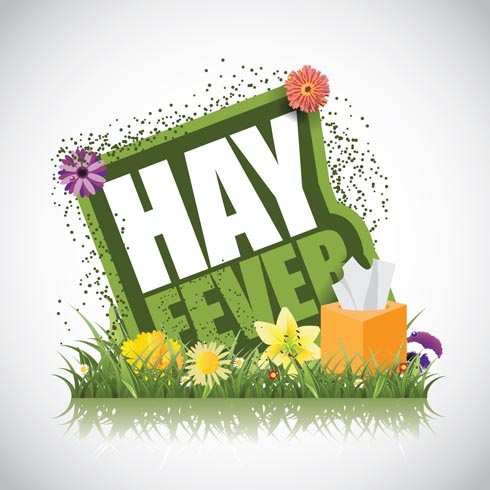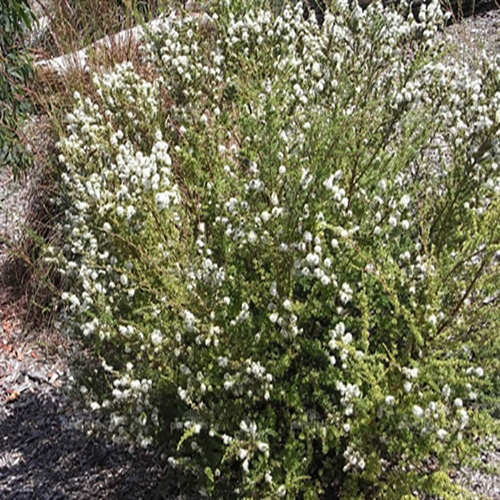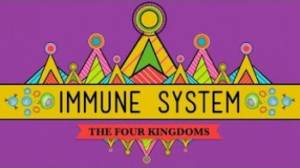Hay Fever
Hay Fever – Rhinitis
The term ‘hay fever’ is misleading since it is very rarely caused by hay, and there is not a fever associated with it. Nonetheless, it does aptly describe the misery that millions of people suffer when the pollen count is high. More correctly, this condition is called ‘seasonal allergic rhinitis’ (SAL)
It generally occurs in spring and summer, although it is really depending on which airborne substance is causing the allergy.
Weather conditions often determine how much pollen is in the air from day to day, because pollens which are produced by grasses, weeds and trees are readily carried by the wind.
For some people, weeds and other plants as well as spores from moulds and fungi can be a trigger. There are over 20 different moulds known to cause an allergic reaction with individuals, and they may be allergic to just one, or in some instances, several of them. And it should be remembered that moulds can survive indoors as well as outdoors. The worst time for these allergens is June to November.
Typical hay fever symptoms
Since the allergy may be caused by various airborne substances and everyone is an individual, this condition can affect people quite differently. However, it is likely you may experience one or more of the following symptoms:
- Nasal congestion
- Runny nose
- Frequent sneezing
- Itchy and blood shot eyes
- Itchy throat mouth and nose and ears
- Loss of smell
- Severe wheezing, rhinitis can trigger nose bleeding
- Difficulty in concentrating
 Histamine reaction
Histamine reaction
The pollens from trees, grass or weeds can cause the immune system to produce antibodies and release a natural substance called histamine that is present in all cells throughout the body. Unfortunately, histamine irritates all the upper respiratory passages such as the nose, sinus, throat and eyes, making them swell and produce most of the typical hay fever symptoms.
Antihistamine medication helps to relieve these symptoms by inhibiting the action of histamine on nasal and eye tissues, but it also causes drowsiness when first taken. Operating dangerous machinery or driving must be avoided until you know how badly you are affected by the medication. And although symptoms can be controlled quite effectively with allergy medication, you can’t get rid of the allergy itself. So what else can be done?
Fragrant relief

Thankfully, there are lots of essential oils that bring some welcome relief to this miserable condition and several ways of using them too. Vaporizing essential oils such as , Eucalyptus Australiana, Eucalyptus Peppermint gum, Rosalina (lavender tea tree) around the home and office, car can help to keep the sinuses clear.
If you are already a bit congested then a steam inhalation with any of these oils will really clear your nasal passages, and remember this method of use is actually one of the best home treatments available for all types of congestion.
Inhaling a few drops of essential oil placed on a tissue will bring quick relief from the effects of pollen when you are away from home and outdoors. The oils instantly get to work soothing and clearing the respiratory passageways, and for many people this is the most effective way to use essential oils to combat this debilitating condition.
Other methods
Essential oils can also be added to a fragrance free cream or lotion base, so that when you apply this as a moisturizer in the morning you will also be getting the benefits of a hay fever treatment too. You only need to add five drops of essential oil for every 30mls of carrier base to create a protective treatment in your skin care.
Massaging the sides of the nose, forehead, temples and the back of the neck with a blend of oils in a carrier also brings soothing comfort for many sufferers. A gentle massaging action around the nose really helps to soothe those streaming eyes and mucous membranes. And a warm relaxing bath with any of the essential oils from our list is yet another easy way to help relieve the worst symptoms.
Other forms of complementary or alternative therapies that can help relieve the misery of hay fever include acupuncture, herbal remedies, homeopathy, immunotherapy, and vitamin supplements.
As always though, if your symptoms persist or worsen you should see your doctor, since unfortunately, there is no cure for hay fever yet.







